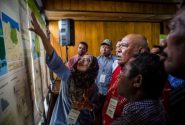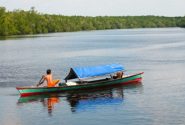
Small-scale loggers in Central Africa could be driven out of business by the EU and US timber import regulations. Ollivier Girard/CIFOR
Loggers in Central Africa could be driven out of business due to the high operating costs needed to comply with timber trade policies in Europe and the US, said experts from the Center for International Forestry Research (CIFOR).
“Loggers now have to now bear the costs of generating new forest management plans, verifying timber and issuance of a legality licence that meets the requirements of the EU and US,” said Richard Eba’a Atyi, CIFOR scientist and co-author of a new report on the impacts of international timber policies on Central Africa’s forestry sector.
“This would amount to about US$5,000 per community forest – representing the average annual earnings of 10 community members.”
But local officials in Cameroon who grant forest titles could help alleviate some of these costs by providing technical support during development of new forest management plans, he said.
Environmental non-governmental organisations launched campaigns several years ago criticising companies for using timber products that did not come from sources that were legal or sustainably harvested.
Operating costs will amount to about US$5,000 per community forest – the average annual earnings of 10 community members.
Strong public support for those efforts helped push through a series of tough policies in Europe (FLEGT/VPA) and the U.S. (Lacey Act) — ensuring imported wood products are made from legally sourced timber.
Such policies also hoped to influence domestic policies in countries that are exporting timber products, such as Cameroon, so that they too push for legally harvested timber.
“We saw this as a welcome development, but very quickly, began to realise that there could be another side to the story,” said Samuel Assembe-Mvondo, CIFOR scientist and another of the report’s co-authors.
Central Africa is more engaged in global timber procurement policies than any other region in the world. It also represents one of the biggest shares of tropical timber imports to the European market.

New EU and US import regulations could negatively affect small-scale operators, such as those in Montée Parc Wood Market, Yaoundé, Cameroon (pictured). Ollivier Girard/CIFOR
According to current forestry policy in Cameroon, the right to log timber can legally be given to either commercial firms or (groups of) private people. The government has identified nine types of legal timber harvesting titles in Cameroon but because of the many different types of titles, enforcing forest law and monitoring forest activity is a major challenge.
The CIFOR study focused on Cameroon because in 2004 it became the first nation to start negotiations with the EU on the Forest Law Enforcement, Governance and Trade’s Voluntary Partnership Agreement (FLEGT/VPA).
Scientists found that while policies could contribute to the sustainable management of forest resources in Central Africa, in the long run, many small-scale forest managers will be unable to implement policies without outside help.
This issue will be one of the topics of discussion at the two-day conference Sustainable forest management in Central Africa: Yesterday, today and tomorrow Yaounde, Cameroon. 22-23 May, 2013.
For CIFOR’s special feature on Central Africa’s forests, visit forestsnews.cifor.org/yaounde
Industrial forest concession holders that harvest timber for export were especially affected, being forced to comply with much higher standards.
“Local officials involved in granting community forest titles should provide more assistance to local communities in meeting FLEGT/VPA requirements so forest managing communities aren’t paying additional costs to obtain proof of timber legality,” said Eba’a Atyi.
Without this assistance, small-scale loggers will be driven out of business, he said, and this will have a damaging consequence on the economies of Central African countries.
“We don’t want to end up in a situation where the doctor unwittingly becomes the undertaker.”
For more information on the issues discussed in this article, contact Paolo Cerutti at p.cerutti@cgiar.org
This work forms part of the CGIAR Research Program on Forests, Trees and Agroforestry and was supported by the European Union.
We want you to share Forests News content, which is licensed under Creative Commons Attribution-NonCommercial-ShareAlike 4.0 International (CC BY-NC-SA 4.0). This means you are free to redistribute our material for non-commercial purposes. All we ask is that you give Forests News appropriate credit and link to the original Forests News content, indicate if changes were made, and distribute your contributions under the same Creative Commons license. You must notify Forests News if you repost, reprint or reuse our materials by contacting forestsnews@cifor-icraf.org.












